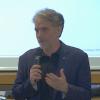Considering a scenario with possible risk of flooding and landslides caused by weather conditions, it results really interesting to investi- gate how citizens take decisions on the basis of different information sources they can access. In this paper we simulated this kind of complex weather scenarios in which a number of forecasts come from different sources. Here a population of cognitive agents trusting differently their information sources can make decisions more or less suited to the spe- cific situation. Our idea is that agents can build their own evaluations on the future weather events integrating these different information sources also considering how trustworthy the single source is with re- spect to each individual agents. These agents learn the trustworthiness of the sources in a training phase. Agents are differentiated on the basis of their own ability to make direct weather forecasts, on their possi- bility to receive bad or good forecasts from an authority and on the possibility of being influenced by the neighbors' behaviors. Quite often in the real scenarios some irrational behaviors rise up, whereby individ- uals tend to impulsively follow the crowd, regardless of its reliability. To model that, we introduced an impulsivity factor that measures how agents are influenced by the neighbors' behavior, a sort of crowd ef- fect. The results of these simulations show that, thanks to a proper trust evaluation of their sources made through the training phase, the different kinds of agents are able to better identify the future events.


